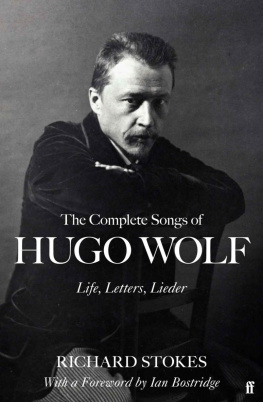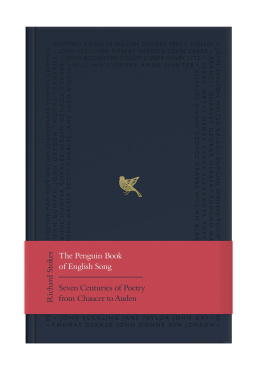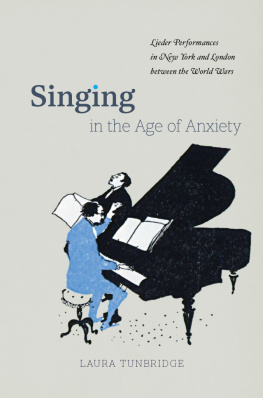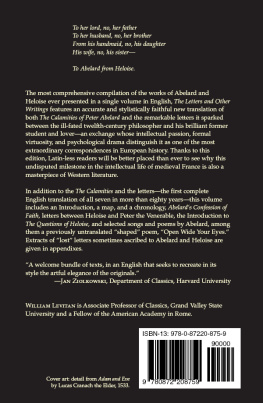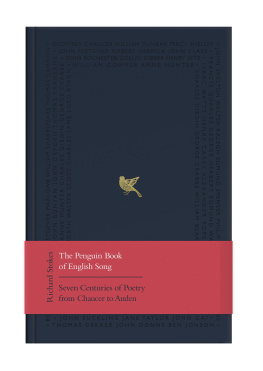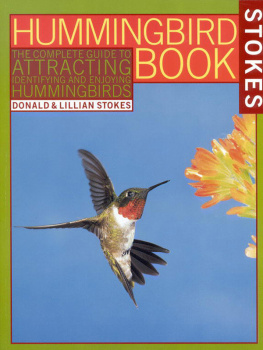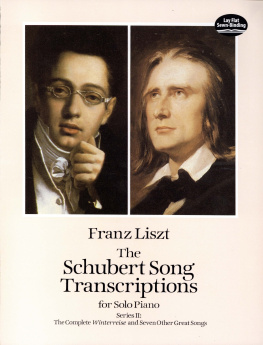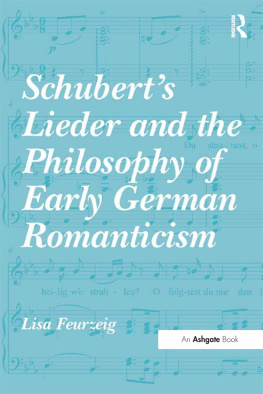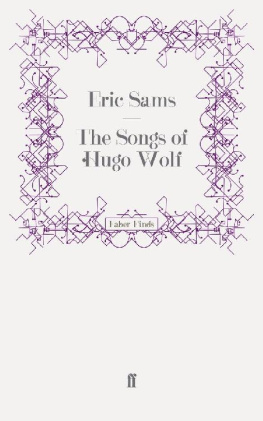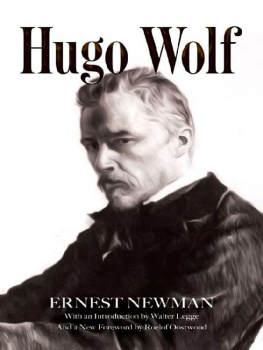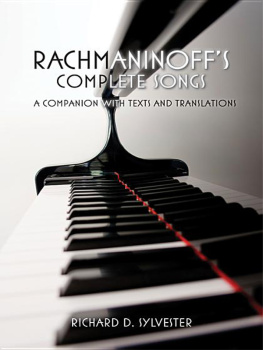Richard Stokes - The Complete Songs of Hugo Wolf: Life, Letters, Lieder
Here you can read online Richard Stokes - The Complete Songs of Hugo Wolf: Life, Letters, Lieder full text of the book (entire story) in english for free. Download pdf and epub, get meaning, cover and reviews about this ebook. year: 2021, publisher: Faber & Faber, genre: Detective and thriller. Description of the work, (preface) as well as reviews are available. Best literature library LitArk.com created for fans of good reading and offers a wide selection of genres:
Romance novel
Science fiction
Adventure
Detective
Science
History
Home and family
Prose
Art
Politics
Computer
Non-fiction
Religion
Business
Children
Humor
Choose a favorite category and find really read worthwhile books. Enjoy immersion in the world of imagination, feel the emotions of the characters or learn something new for yourself, make an fascinating discovery.
- Book:The Complete Songs of Hugo Wolf: Life, Letters, Lieder
- Author:
- Publisher:Faber & Faber
- Genre:
- Year:2021
- Rating:4 / 5
- Favourites:Add to favourites
- Your mark:
- 80
- 1
- 2
- 3
- 4
- 5
The Complete Songs of Hugo Wolf: Life, Letters, Lieder: summary, description and annotation
We offer to read an annotation, description, summary or preface (depends on what the author of the book "The Complete Songs of Hugo Wolf: Life, Letters, Lieder" wrote himself). If you haven't found the necessary information about the book — write in the comments, we will try to find it.
The Complete Songs of Hugo Wolf: Life, Letters, Lieder — read online for free the complete book (whole text) full work
Below is the text of the book, divided by pages. System saving the place of the last page read, allows you to conveniently read the book "The Complete Songs of Hugo Wolf: Life, Letters, Lieder" online for free, without having to search again every time where you left off. Put a bookmark, and you can go to the page where you finished reading at any time.
Font size:
Interval:
Bookmark:

OF
HUGO WOLF
LIFE, LETTERS, LIEDER
RICHARD STOKES
WITH A FOREWORD BY IAN BOSTRIDGE

v
FOR GRAHAM JOHNSON vi
vii
hw to Josef Strasser, Perchtoldsdorf, 23 March 1888
Was ich jetzt aufschreibe, das, lieber Freund, schreibe ich auch schon fr die Nachwelt. Es sind Meisterwerke [] darber es unter Musikverstndigen nur eine Stimme gibt, dass seit Schubert und Schumann n ichts hnliches da war.
What I now write, dear friend, I write for posterity also. They are masterpieces [] about which there is only one opinion among those of musical discernment namely that there has been nothing like them since Schubert and Schumann.
hw to Emil Kauffmann, Traunkirchen, 12 October 1891
Wahrlich, mir graut schon vor meinen Liedern. Die schmeichelhafte Anerkennung als Liederkomponist betrbt mich in die innerste Seele. Was anders will es denn bedeuten, als eben einen Vorwurf, da ich immer nur Lieder componire, da ich doch nur ein kleines genre beherrsche u. dieses nicht einmal vollkommen.
Truly, I have come to dread my songs. The flattering recognition Ive gained as a song composer makes me sick at heart. What else does it mean, other than a reproach that I only ever write songs, that I am only master of a small genre, & do not even have complete mastery of that. viii
- x
IAN BOSTRIDGE
I owe my love for the Lied to the author of this book, Richard Stokes, my German teacher at my London school, who enthused whole classes of awkward adolescents with the rare joys of experiencing great poetry through the transformative apparatus of Romantic song. We sang songs together in class and we went to concerts, notably the Songmakers Almanac evenings which the pianist Graham Johnson was hosting down the road at Wigmore Hall.
What an extraordinary moment in Londons musical life it was for song lovers, around 1980; a felicitous fusion of one audience (elderly German expatriates) steeped in the culture of their upbringing, and another excited by the notion of London as a capital of European culture. It all came together in a hall that opened less than two years before the death of Hugo Wolf, the Bechstein Hall, now the Wigmore, a perfect space for song, which embodies in bricks, mortar and marble the words that open Wolfs Italienisches Liederbuch Auch kleine Dinge knnen uns entzcken small things can also delight us.
And so London ended up being the European centre not just of capital markets but also of the Lied. A hundred years after the death of Hugo Wolf, song recitals and song audiences were flourishing in London in a way unimaginable in Paris, Amsterdam or even Vienna and Berlin. And, twenty years on from that, the Wigmore is still at the forefront of keeping song alive in the midst of a phenomenon with a very early twentieth-century feel, a global pandemic.
Schubert was for us schoolboys the beginning of it all the drama of Erlknig to set out with, but then the whole gamut from the ravishment of Gretchen am Spinnrade to the sly charm of Heidenrslein, and finally a first encounter with the Everest of the genre, Winterreise. For adolescent boys of a certain tragic disposition, Die schne Mllerin was, of course, indispensable. With all this wonder-ful musical experience at hand, we learned some of the first lessons of the Lied: bad poems can make great songs; melody is not everything.
Schubert was misunderstood, even by his friends, as a melodist. It is true that in the mysterious business of creating memorable, satisfying melodies (as opposed to catchy, insistent tunes) he was a master. But what made the Romantic Lied new was the symbiosis between voice and piano. This relationship is intensified in the songs of Robert Schumann, and by the time we get to Hugo Wolf and the late nineteenth century, any idea of the piano part of a song as mere accompaniment is absurd. xii
My very first encounter with Hugo Wolf predated my schoolboy love affair with the Lied and feels sort of accidental. In the 1970s, Leonard Bernstein persuaded Barbra Streisand to record an album of classical song, Classical Barbra, which included among its tracks the delicate yearning of Wolfs setting of Eichendorffs Verschwiegene Liebe. My brother owned the album and so, secretly, Wolf must have entered my bloodstream.
As a fragile teenage tenor I was impressed by the mighty side of Wolf: for instance, the fury and terror of Der Feuerreiter from the Mrike songbook, a song I didnt dare sing in public until I was well into my thirties. For an idea of how simply gripping a Wolf song can be, watch Dietrich Fischer-Dieskau and Sviatoslav Richter rehearsing it, on YouTube, F-D simply astonished by Richters casual virtuosity he seems to be sight reading and relishing every feverish moment. Late at night as an undernourished adolescent I would grapple with the titanic defiance of a song which I will never sing in public, Wolfs setting of Goethes Prometheus, a bass-baritone song if ever there was one, but a masterful rendering of a great, great poem.
Here is one issue with Wolf that singers must deal with, the issue of transposition. While Schubert seems to have been quite relaxed about which keys his songs should be sung in, Wolf was apparently more picky. It has been common over the years for baritones to transpose Wolfs songs down; less common for tenors, for example, to transpose them up. Prometheus does have a low resonance grandeur, in piano and voice, which it is difficult to ignore; but over the years the very different grandeur of another Goethe setting, Grenzen der Menschheit, has drawn me back to it again and again. There can be no greater example in the whole song literature of a piece that binds together metaphysical poetry and metaphysical music to give us a vision of the infinite. If I transpose it, I feel guilty, but I cant give it up.
There are songs of Wolf that I continue to find refractory the percussive clatter of some of the drinking songs from the Goethe set is challenging for performers and audience alike, and its difficult to avoid a hint of unwanted aggression. But what I take away overall from my experience with Hugo Wolf is his wonderful way with melody, when it suits the poem a poem like Der Grtner, or Verborgenheit, or the peerless Nun wandre, Maria from the Spanisches Liederbuch and his ability in other songs to create such extraordinary intensity that lack of obvious melody, as the voice traces the movements of the mind, is both appropriate and unnoticed. In my early twenties, the Mrike settings of Peregrina I and II were often with me in concert and masterclass, and one cannot live more fully as a singer than by singing these burning, brief masterpieces.
Ive performed a lot of Wolf over the past quarter-century, but two experiences stand out. First, a series of concerts, in Europe and the US, with close colleagues (Angelika Kirchschlager and Julius Drake) performing the Spanisches xiii Liederbuch. As a concert piece, the set is unwieldy, though every song is to treasure. The religious songs are just right for one half of a recital; the secular songs are simply too many. The whole cycle is really one and a half evenings worth, an awkward length to be sure. We ruthlessly decided to perform only a selection of the secular songs, and it was liberating.
Second (and, again, with Julius Drake), I remember some early recitals of the
Font size:
Interval:
Bookmark:
Similar books «The Complete Songs of Hugo Wolf: Life, Letters, Lieder»
Look at similar books to The Complete Songs of Hugo Wolf: Life, Letters, Lieder. We have selected literature similar in name and meaning in the hope of providing readers with more options to find new, interesting, not yet read works.
Discussion, reviews of the book The Complete Songs of Hugo Wolf: Life, Letters, Lieder and just readers' own opinions. Leave your comments, write what you think about the work, its meaning or the main characters. Specify what exactly you liked and what you didn't like, and why you think so.

